Pixel Valhalla
Escaping from Sexual Niflheim
When moderns think of the afterlife, if they believe in it at all, they tend to imagine the Great Retirement Village in the Sky. It’s a pleasant grassy field next to a placid lake, where it’s always mid-September, rain never falls from the fluffy white clouds, and the sun is always warm but never hot. Waiting on the shore are Grandmama, Uncle Albert, and Rover, who you haven’t seen since he got hit by a car when you were eight but is of course present because as everyone knows, unlike people, all dogs go to Heaven. Getting into Heaven isn’t hard. You don’t have to believe in God or do anything strenuous, you just have to be sufficiently nice. Maybe there’s a Hell, which isn’t very nice, but only serial killers and Hitler end up there. So long as you’re a pleasant person you don’t have to worry about damnation, anyhow. You’ll go to the good place, and once you’re in, you’ll spend eternity padding around and making chit-chat about old times.
It’s pretty boring, which is about the only thing it has in common with the more traditional Christian vision of Heaven, where one joins the angelic hosts and the legions of saints in a great, spiralling procession about the golden throne of the Almighty, raising their voices in rapturous hymns to His glory, your spirits united in soaring and eternal bliss. Basically mass, but for eternity. It’s a vision of the afterlife that only a priest could love, and maybe this is why Hell had to be posited. Getting into Heaven, according to many of the more demanding Christian traditions, is a lot of work: the path to salvation is always open, but is narrow and difficult, while the path to perdition is wide and effortless. The reward for picking one’s way along that perilous escarpment might seem a bit underwhelming, but it beats being tortured by cackling demons for the rest of time. There’s an implicit acknowledgement of the dullness of the Good Place in the Christian tradition in the recurrent jokes about how all the interesting people end up in Hell.
Famously, the pagan Scandinavians had an entirely different concept of the afterlife. They too had their Heaven and Hell, indeed Hell derives from the proto-Germanic haljō, their word for the underworld, and is almost certainly related to Hel, the Norse goddess of Niflheim, which was the bad place you didn’t want to go after you died. Unlike the infernal lake of fire in the Christian Hell, Niflheim was a frozen wasteland. Accounts differ as to whether Niflheim was a dungeon for the souls of evil men, outcasts, oathbreakers, and cowards, or simply the dumping ground for the unexceptional, which rather suggests that in practice little distinction was made between the two.
Exceptional warriors who died courageously in battle1 were taken up to Valhalla by the Valkyrie, literally the choosers of the slain, there to become Odin’s Einherjar, his army of “one-man armies”. The Einherjar would spend their days spilling one another’s blood in single combat in the fields outside Odin’s corpse-hall. At dusk the slain would be resurrected and the wounded healed. They would then retire to a night of raucous feasting and swiving under Valhalla’s roof of spears and shields, quaffing mead drawn from the udders of the goat Heidrun and served in horns by the Valkyries, and eating the roasted flesh of the immortal beast Sæhrímnir which, like the Einherjar themselves, would simply resurrect after being slaughtered.
Some might object that surely this endless round of fighting and feasting and fucking would start to pall after a few centuries, and perhaps it would, but it’s not meant to go on forever. Odin does not gather the Einherjar out of the goodness of his heart. He’s building an army to throw against the frost giants when Ragnarok comes, the World Tree falls, and Fenrir eats the Moon. The daily combat is not entertainment but training. The Allfather recruits the best of the best, and then uses their afterlives to make them even deadlier.
I’ve always thought that Valhalla sounds like a lot more fun than Heaven, and the Norse seem to have agreed. Their conviction that a brave death in combat was the ticket to a glorious afterlife made them notorious for the fearless abandon with which they fought. I doubt that any Northman made cracks that they’d prefer to be in Niflheim, as that was where their friends would be.
It isn’t only me who thinks Valhalla sounds pretty sweet. The revealed preference of the modern NEET is telling. His daily life hits the experiential notes of Valhalla almost perfectly.
By day he immerses himself in video games, entering a virtual world in which he is a one-man killing machine spreading slaughter and mayhem with flaming sword and plasma rifle. When he dies, he respawns moments later and re-enters the fray with a topped up health bar, albeit usually sans whatever weapons he picked up in the last round.
After he gets bored of playing lord of war, he puts down the controller and picks up the lotion, immersing himself in the fleshless-pots of the Internet, where he enjoys an infinitely varied harem of supple and willing whores offering themselves up to him in their tens of thousands for his vicarious delectation.
It’s all fake, of course, and of course the gamer boy knows this. One might argue that Valhalla was fake, too – although... – but the salient difference is motivational. To gain entrance to Valhalla required great effort, whereas Pixel Valhalla is entered effortlessly. To become an Einherjar demanded a life spent training with weapons, long and hazardous journeys over choppy seas only to land in hostile and dangerous territory, pressing oneself into the vicious scrum of the shield wall to risk maiming and death lest one break the oaths made to lord and brothers. To become a NEET requires nothing but a PlayStation and an internet collection. Valhalla was an inducement to action in the world; Pixel Valhalla an invitation to retirement from the world. To be chosen for Valhalla was an honour; to spend one’s days in Pixel Valhalla, a source of shame. No one who spends his life in Pixel Valhalla will never be chosen by the Valkyries for the real Valhalla.
But why are so many young men withdrawing from the world? The obvious answer is that our world offers them so little. There is no adventure in Safety Land. There is no meaningful work under a managerial regime that reduces humans to entries in a spreadsheet whose job is to fill out more entries in a spreadsheet. There is no way to prove themselves in a culture that prizes equality over quality. That the Norse vikings envisioned an afterlife that was simply their actual life amped up to eleven is telling. Their afterworld was not a retirement from life; their reward for a life of war was more war, as preparation for the ultimate and final war. And they looked forward to this. To earn one’s place in the Hall of the Valr spurred them on to valour. Valhalla speaks to something primal within the male spirit – the hunger for the joy of battle, the yearning for the razor’s edge of the hunt, the instinctive knowledge that they are meant above all to be predators. Modernity denies them this utterly, imprisoning them within cages of regulation and creature comfort, and offering Pixel Valhalla as a sop the way an infant is given a pacifier.
And as for the women it offers, well....
If you don’t get the joke, it’s riffing off of graphs such as this:
That particular analysis came from the Atlantic, who developed it on the basis of a dataset assembled by the American Enterprise Institute’s Survey Center. It’s hardly unique, and while any given survey has a margin of error I don’t think there is anyone who hasn’t noticed that young women have gotten simultaneously more left-leaning and more emotionally unstable over the last several years, with the combination of these traits making them shrill, intolerant, and generally unpleasant. Left-leaning women are, at least for the present, largely unwilling to date men who don’t share their passionate devotion to unlimited third world immigration, anal sex parades, mutilating the sex organs of children, and sacrificing unborn babies to Moloch.
The result? The fuck rate has collapsed.
Over most of the last few decades, the fraction of young men identifying as liberal tracked the female fraction fairly closely. They don’t decouple until 2016, when the the female liberal fraction goes vertical. Shortly after that, male political allegiances start to diverge, with fewer leftist men and more men adhering to the right. That the rightward lurch of male politics followed the leftward spike in female politics is notable. It suggests the right-wing turn in the male population is a reaction. Rather than becoming more liberal to satisfy the ladies, they jerked to the right in disgust.
Judging from the stories coming from inside the schools, it’s obvious why this has happened. The girls are told how wonderful they are, that the future is female, and so on; the boys are relentlessly shamed, and offered nothing by the system save opportunities for more shame.
There are only about half as many leftist men as leftist women, and only about half as many conservative women as right-wing men. As the above graph shows, currently about one quarter of the single population would need to marry across the political aisle in order to pair everyone off. Since left-wing women refuse to date anyone who doesn’t affirm their every histrionic delirium, which is more and more the only sentiment with which right-wing men are ready to agree, the number of actual pairings drops.
It isn’t only politics driving the sex drought of course. Tindergamy has played a big part in it, as has the corrosion of embodied, spontaneous sociality due to pervasive phone hypnosis, to say nothing of the way in which MeToo has turned approaching women into a minefield. Go out to a bar these days and it’s notable how little interaction there is. Even friend groups spend much of their time with their phones rather than their friends.
Another factor is socioeconomic. Men marry across and down in the hierarchy; women marry across and up. Men are uninterested in marrying women who make more than they do, and the reverse is even more true for women; when an income disparity emerges after a relationship has already started, that relationship is usually doomed. Present socioeconomic status isn’t necessarily the determining factor. When young, perceived future prospects are also very important. But the principle is still the same.
The imperative of feminism to take a sledgehammer to every glass ceiling has in practice amounted to a grand societal project of systematically elevating women by providing them every advantage in university admissions and corporate hiring, while by necessary symmetry men are disadvantaged. As organizations have become more dominated by women numerically they have naturally been terraformed by the social preferences of women, with competition becoming more indirect and based on adherence to the immoral code of woke propriety rather than objective performance.
This is a double-whammy to mating prospects. First, by artificially raising women above men, there are simply fewer appropriate socioeconomic pairings available in the general population: women who make more than most men will not consider most men as potential romantic prospects, and of course the corollory is true for the men. At the same time, the kind of men who prosper within the feminized organizational hierarchy are not, in general, the kind of men that women instinctively prefer. The stereotype of the alpha Chad – six feet tall, with a six pack, making six figures – is an increasingly rare type, because the devouring den mothers systematically exclude such men from advancement. It’s no accident that manager-voice and gay-voice have become indistinguishable from one another. The kinds of men that the women of the professional classes encounter professionally, or within their own economic class, tend to be physically weak, self-effacing, mild-mannered, and generally effeminate to a panty-drying fault. Both men and women are placed in an impossible situation: a man must choose between being a man, and advancing (but if he advances by becoming a spiritual neuter, is he still a man?); a woman must choose between a man (who is under these circumstances less likely to be a ‘provider’, which is to say, to rise higher than she can in the socioeconomic hierarchy), and a male who can provide, but is not a man.
The roles played by other factors notwithstanding, politics is observably playing a huge role in turning the sexes into mutually suspicious armed camps, although it’s worth asking to what degree politics is causal, and to what degree the disparate and incompatible political stances emerge from recognition by both parties of the irresolvable antagonism produced by an artificial socioeconomic system at war with human sexual psychology. Regardless, men and women have become two great powers glowering at one another in a Cold War of the Sexes, both sides trapped in frozen, lonely misery in the lifeless, shadowy mists of a Sexual Niflheim.
If things continue as they are the only possible outcome is societal devastation. Quite apart from the collapsed fertility and concomitant depopulation, the policies adopted with such fervent determination by the young, single, female, and mentally ill population are without exception suicidal. Mass immigration floods societies with unassimilable aliens, leading to ethnic strife, skyrocketing housing costs, and flat wages; the war on global warming leads to deindustrialization and therefore poverty; the anti-meritocratic imperatives of DIE lead to a devastating decline in professional and institutional competence that makes technological and social infrastrucure impossible to maintain. Unless women are induced to change their politics, Western civilization will be driven off a cliff. It is already happening.
All else being equal, I think we would see women abandoning woke politics after a while, as they realize that if all the men are shitlords, their only romantic options are shitlords. Women tend to be more ideologically malleable than males: they’re the most enthusiastic supporters of whatever they perceive the dominant morality to be, but they also tend to adopt the worldviews of their husbands much more so than husbands do that of their wives. That’s assuming they’re married to dominant, high-t men, of course. The women who marry the kind of male feminist that settles for an obese HR goblin in her late 30s generally tend to be ones who call the shots in the marriage ... and the matrix of seed oils, weed, IPAs, and endocrine-disrupting microplastics has produced a sluggish army of hormonal castrata. An acquaintance of mine demanded her husband send her a picture of his ballot during the last presidential election, to verify that he had not voted for Orange Hitler, which of course he dutifully did. These marriages often strike me as more like the woman buying herself a Pomeranian than landing a husband, and I can’t imagine their sex lives are much to write steamy romance novels about. I expect they are deeply unfulfilled. For those women who yearn for something more satisfying, however, perhaps they’ll realize that the marxcissism they’ve been inducted into has trapped them in a wasteland.
All else is not equal, however. The pressure on women to conform to woke ideology is intense. It cannot be assumed that they will abandon it simply due to romantic misery.
Another possibility is that men start forming gangs and starting trouble. Historically, large numbers of unmarried young men with no prospects for finding a wife are a destabilizing force. They have nothing to lose but their lives, and young men with no dependants hold their lives lightly. They start aggregating together and looking for adventure. The calculus is simple: a small chance at fortune, fame, and the sexual access that comes with it is better than no chance at all, especially when it comes with a 100% chance of adventure, however short that adventure may prove to be.
It was precisely this dynamic that drove the Northmen forth from their lands to go viking in the first place. Arable land is scarce in Norway, Sweden, and Denmark, and so every generation produced a surplus of young men for whom no land could be found. With no land, there was no possibility of wealth, and therefore of marriage, and therefore of sons. So they built longships and joined brotherhoods of steel and blood, and ventured out to take the land and women of others.
This has happened many times. During the Age of Exploration Portugal and Spain had large surplus populations of young, landless men: second and third sons of the landed aristocracy with no inheritance coming their way, and no choices for a future aside from joining the clergy or taking land from others. During the Reconquista such men could take their land from the Moors whom they were slowly pushing off of the Iberian peninsula in a bloody, grinding war that lasted centuries. By the end of the 15th century the last Moor was gone and the whole of Iberia was in the hands of the Portuguese and the Spaniards. Luckily for the stability of Spanish society, Columbus discovered the Americas the same year that the last Moor was ejected from Spain, and their young men could pivot seamlessly from the reconquest of their ancestral homeland to the conquest of the New World.
After the foundation of Rome, the city was primarily inhabited by young warriors, bandits, and adventurers who flocked to what would become the Eternal City. These men had no wives, and none were to be found, and one can only imagine that this was leading to dissatisfaction and discord, to say nothing of the obvious problem of sustaining the city’s population beyond a single generation. The Romans tried negotiating with the surrounding peoples, but none would part with their daughters. So Rome decided to take them. Romulus threw a party, holding games and a feast, to which he invited the surrounding tribes. When all were good and drunk his soldiers abducted their daughters and fought back their fathers and brothers. This was the infamous Rape of the Sabine Women.
The other tribes didn’t take this lying down. There was war, but one by one Rome defeated them and took their cities (and, presumably, their women). Finally they faced the Sabines themselves, but by this point the Sabine women had Stockholm syndrome. Their Roman husbands had treated them well, making honourable women of them, giving them property rights, and like any women they loved the children that they had borne2. The Sabine women threw themselves between the two armies and implored their husbands and fathers to stop fighting, which they did. Rome and Sabinum were joined as one nation, which soon enough simply became Rome.
Can such a thing be done today? A pack of gym bros strolling in to the nearest yoga class and walking out with the instructor and her yoga bunnies slung over their shoulders like sacks of struggling and very noisy potatoes is likely to draw police attention, and unlike the Romans facing off against the Sabines, this is not a confrontation the gym bros are likely to win.
Frat parties don’t involve abduction per se, but they do tend to involve large groups of young men inviting over large groups of women – just as the Romans started their escapade with a feast – and letting vodka tonics and cheap beer due to abducting. It’s not accidental that frats and to a lesser degree sororities have been under sustained administrative attack throughout the teens and twenties. The ladybosses in the student life office have been systematically shutting them down on every pretense they can find, and the survivors are watched like hawks.
To find women, many imagine, one must go where the women are. There’s a campus trope of single men signing up for women’s studies classes in which they are the only males in a target-rich environment, conspicuously agreeing with everything the ladies say, and thereby hoping to get laid. In general this sneaky fucker strategy doesn’t work very well; women do not respect men who bow to their every shit test.
Imagine a variant of this strategy, though. A group of young guys signs up for some diversity and inclusion course, with absolutely no intention of passing it. They should plan to drop the class before it brings down their GPAs, and of course they should be comfortable being put on blast on social media. They must adopt a no-shits-given attitude, their motto must be Hippocleides Doesn’t Care. Rather than pretending to agree with the nonsense in hopes of ingratiating themselves, they make it their mission to be disruptive, even cruel – targeting the course’s AWFL instructor for mocking disagreement, with the goal of making her look foolish, getting her flustered, ideally even eliciting an emotional breakdown complete with shrieking tears of helpless rage. Academics of this type are almost universally haunted by the taunting devil of imposter syndrome, neurotically terrified that they’ll be found out as intellectual frauds: they know full well their ‘discipline’ is a word smoothie of obtuse jargon and logical contradiction, and that their positions were bestowed on the basis of victim points rather than any actual scholarly merit. Getting an emotional overreaction to pointed ridicule shouldn’t be difficult. It goes without saying that classmates who defend the professor’s view should be derided as well, most especially the males. None of them will be used to having to defend their luxury pieties, much less to being mocked for them. In an environment in which none dare backtalk their moralizing betters, such a band of pranksters would certainly get attention, elicit intrigued side-glances from the curious, and maybe result in the the boys walking away with gfs: class clowns rescuing maidens from cordycepting by clown world.
I don’t really suggest bridal IRL troll raids as a serious large-scale strategy. Even if they worked a few times, the system would certainly adapt to make future raids impossible. It’s likely that campus codes of conduct would be amended to allow summary expulsion, assuming they don’t already. Besides, that specific tactic is only really available for college students, and increasingly, young men aren’t going to college anyhow.
So what should young men do? Certainly they should form groups, and work to destabilize society. The thought experiment above was an illustration of the kind of spirit that is required: subversive, playful, impudent, irreverent, blithely unconcerned with consequences. Much of the sport of the online right is just such an assault on the demented mores of late-stage liberalism, but it doesn’t seem to have had much of an effect on the politics of young women, the Dimes Square vibe shift notwithstanding. Whatever else it is, shitpoasting with an anime pfp is not high status, no matter how many frens you do it with or how many liberal journalists block you. Perhaps I’m wrong about this, and simply too impatient, but one way or another things do have to migrate into meatspace at some point.
A healthy response would be for men to turn their backs entirely on the society that has frozen them out, to build independent competence hierarchies of their own as they construct a parallel economy outside of the professional-managerial corporate system. I think over time this would prove effective. Such men would be capable of materially supporting themselves. As the parallel society grows in importance, status within it will eclipse status within the legacy institutions; indeed, having any status at all within legacy institutions will increasingly be seen as low status. High status men are more or less tautologically those men that other men agree are high in status, and women will generally adopt the evaluations of other men as their own heuristic. If the men who rise in status within the parallel society are also, in general, more likely to be classically masculine than the worms slithering their way up the org charts of the legacy institutions, it will be game, set, and match.
There are groups already trying to do this, and having some very small degree of success. I think we would be much further ahead, however, if it were not for one thing: Pixel Valhalla.
Absent video games and porn, the legions of men left disenfranchised by the current system, with nothing but time on their hands, would be directing their restless energies towards carving out their place in the world. Pixel Valhalla soaks these energies up, onanistically squanders them, and in doing so, stabilizes the system.
Many others have noticed this. Here’s an interview with Rob Brooks, a professor of evolutionary biology who studies the intersection of entertainment with human sexuality and its effects on human society. Brooks suspects that were it not for Internet porn, our cities would already be in flames, and he is very happy about this. He is, after all, a plump, comfortable, and self-satisfied scion of the expertocracy. The system is working very well for him, and if it has consigned a huge fraction of young men to shadow lives of quiet misery, that’s regrettable in his eyes but certainly preferable to any unpleasantness. In the moral universe of the managerial class, disorderliness, disruption, and especially violence are the worst possible evils, and if spiritual death is the price of averting it then this is a price worth paying. Especially if it’s paid by others.
Personally I take the opposite view. A social order that deliberately gets its young men strung out on free electronic heroin in order to protect itself from their natural discontent at being rendered involuntarily celibrate due to their society’s women having been not only artificially raised above them but also turned viciously against them is a society that deserves cleansing fire.
It may be morally repugnant for Brooks to shrug at this wastage of the male spirit, but that doesn’t make him materially incorrect. Pixel Valhalla has obviously been working. He also expects it to get worse – for Pixel Valhalla to become even more seductively sophisticated. The porn/video game combination can substitute for sex and war, but cannot speak to the yearning for romance.
Enter Artificial Intimacy.
Brooks notes that intimacy is largely algorithmic: one party shares something trivial about themselves, their name for example, and the other reciprocates; over time more specific and meaningful memories, thoughts, impressions, observations, dreams, and feelings are shared, until eventually you’re telling one another about the most deeply personal matters – things maybe you barely even admit to yourself in the privacy of your own mind. This is accompanied by a growing feeling of emotional closeness: as you entrust the other with more private details of your life, you naturally trust them more. In principle, this can be automated, with the AI prompting the user with leading questions derived from previous responses, and the machine’s own biography and inner life being procedurally generated as the user interacts with it.
The user would know that his simulationship with an emotional responsiveness model speaking through a hologram is fake, just as he knows that porn and video games are fake. But his AI gf will always be there for him, will never grow distant, never give him the silent treatment, never cheat on him, never abandon him, and the only thing he need invest is time (and $14.99 a month to turn off adds, $49.99 to unlock dirty talk). It will never be as good as the real thing. It will never be a flesh and blood woman laying her head against his shoulder, never smell of pheremones and flowers, never wrap warm, living fingers through his own as they walk down the street, never intertwine her legs around his as she cuddles close on a cold winter’s night. But the simulationship will be just good enough that, during all those moments through the day, when he needs it the most, he can pretend. Just as he pretends to be lord of war in the first person shooter, when he knows he’s sitting hunched forward on his couch.
Our rulers are hoping that they can stabilize society this way, the same way other societies stabilized themselves against an excess of unpartnered young men by sending them to monasteries, filling their days with chants and prayers that distracted them from certain Darwinian oblivion. If they’re correct about this, if they are successful in imprisoning a lost generation of men in Pixel Valhalla while bewitching them into simulationships with digital succubi, then I think they will win in their quest to enslave the world.
It is only the restless, violent energy of young men that can prevent humanity from being wrapped forever in electronic chains. Women cannot do it themselves. Their own instincts have been too thoroughly subverted. Their minds have been imprisoned in a tower of ivory skinnerboxes by a dragon built of propaganda and operant conditioning. They’ve been stung by a vast parasitic wasp that has suborned their minds with dopamine venom, in order to turn their irreplaceable and precious youth into food for the larval prison world the dark magicians are growing into place around all of us.
They need to be saved; deep down, I think, they want to be saved, to be swept off their feet, abducted, and carried over the threshold into a more human world.
I believe we can do this.
But first we have a monster to slay.
Thanks for reading this long, rambling, and undisciplined stream of logorrheic consciousness. If you enjoyed it, please consider subscribing, and if you’re already a subscriber, please consider upgrading to a paid subscription. The archive of Postcards From Barsoom is free for all, for I am both generous and vain, but it is above all the generosity of readers that keeps this project going.
Exceptions were made – Ragnar Lothbrok died in King Aella’s snakepit, but was still taken up by the Choosers of the Slain. But then, Lothbrok had more than proven himself.
As you may have noticed, the ‘rape’ of the Sabine’s daughters didn’t (according to most accounts) involve sexual assault. To the contrary, the ladies were treated with the utmost delicacy. The ‘rape’ originates with the Latin term rapto, which really means to abduct. That it continues to be translated into English as ‘rape’ is probably due to the glee classicists take in the lurid; the fact that I waited until now to clarify matters is certainly due to that.




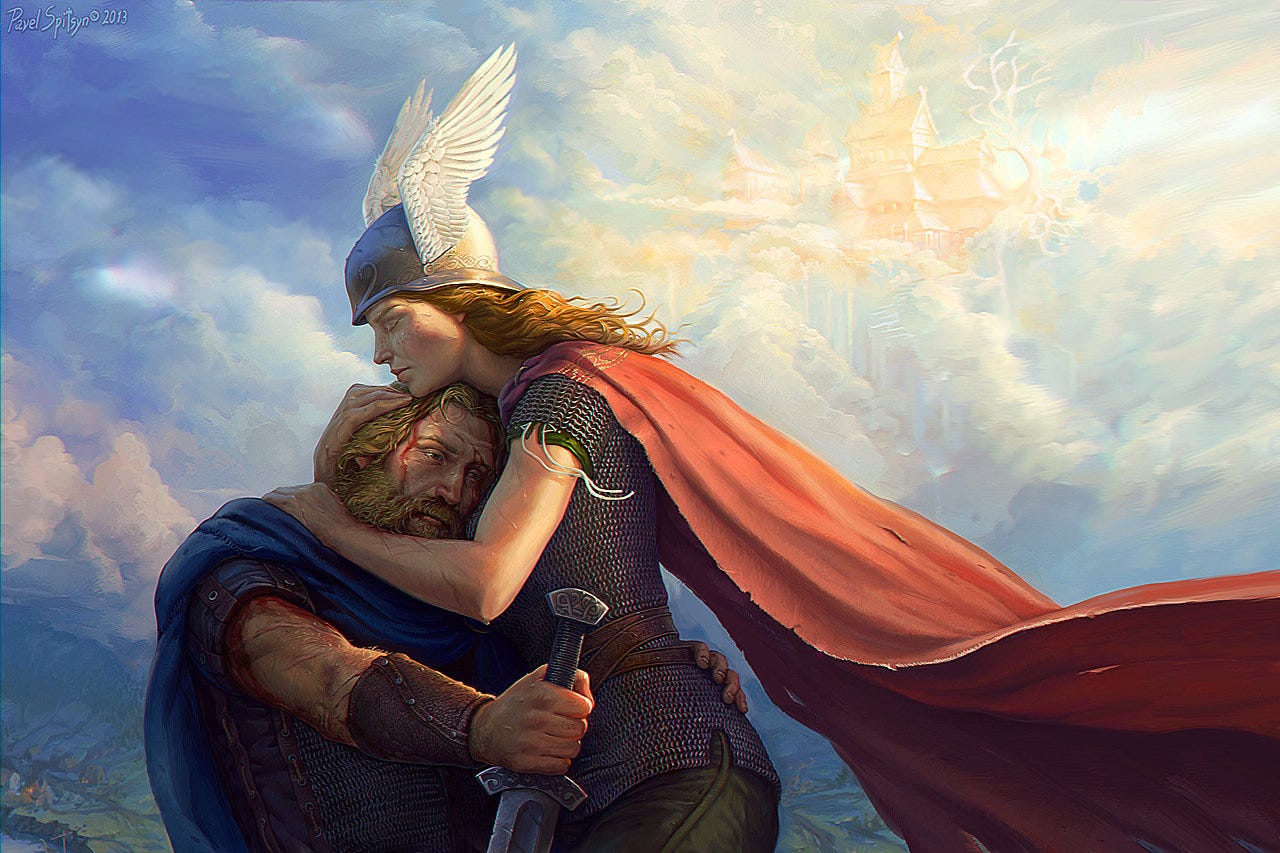
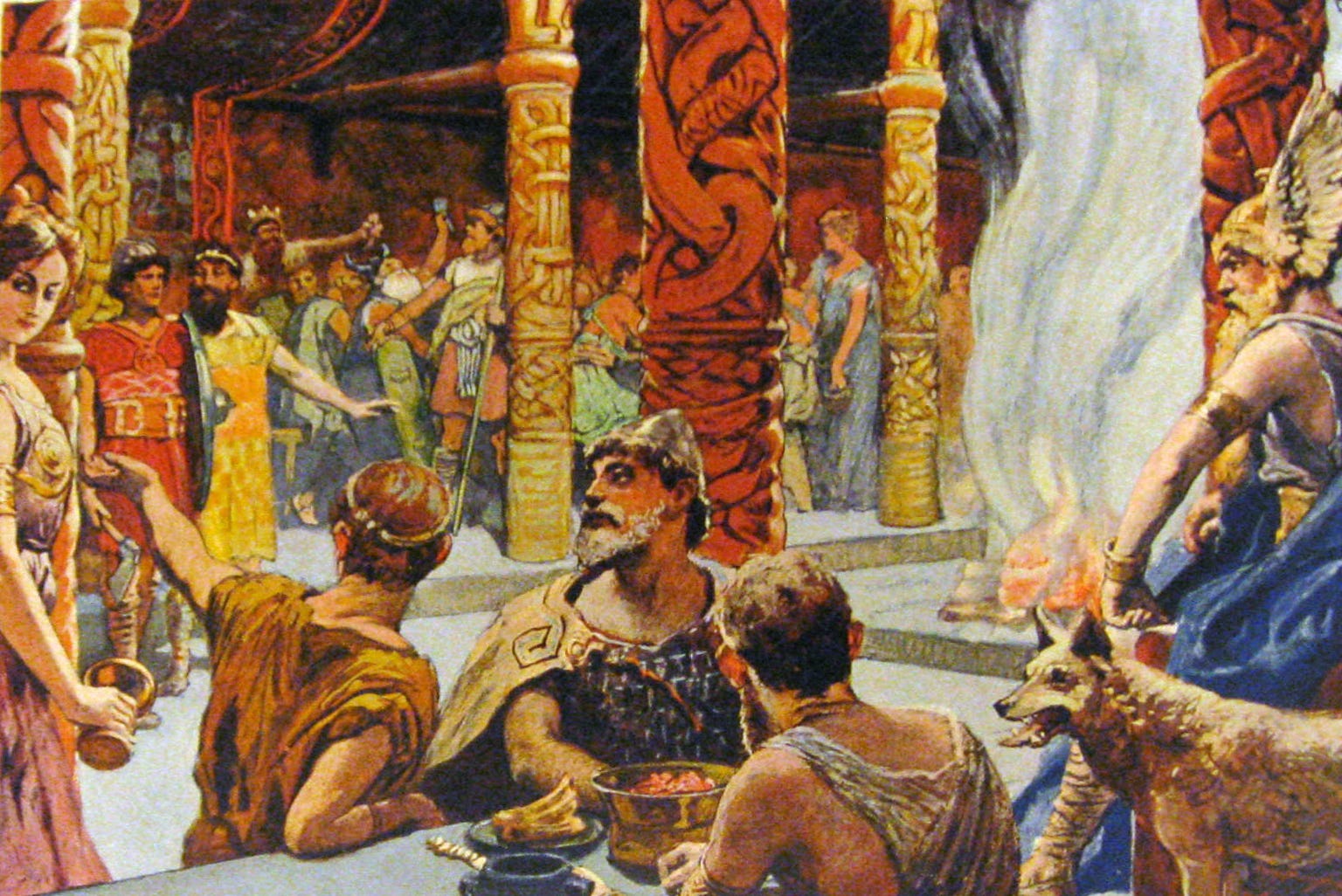

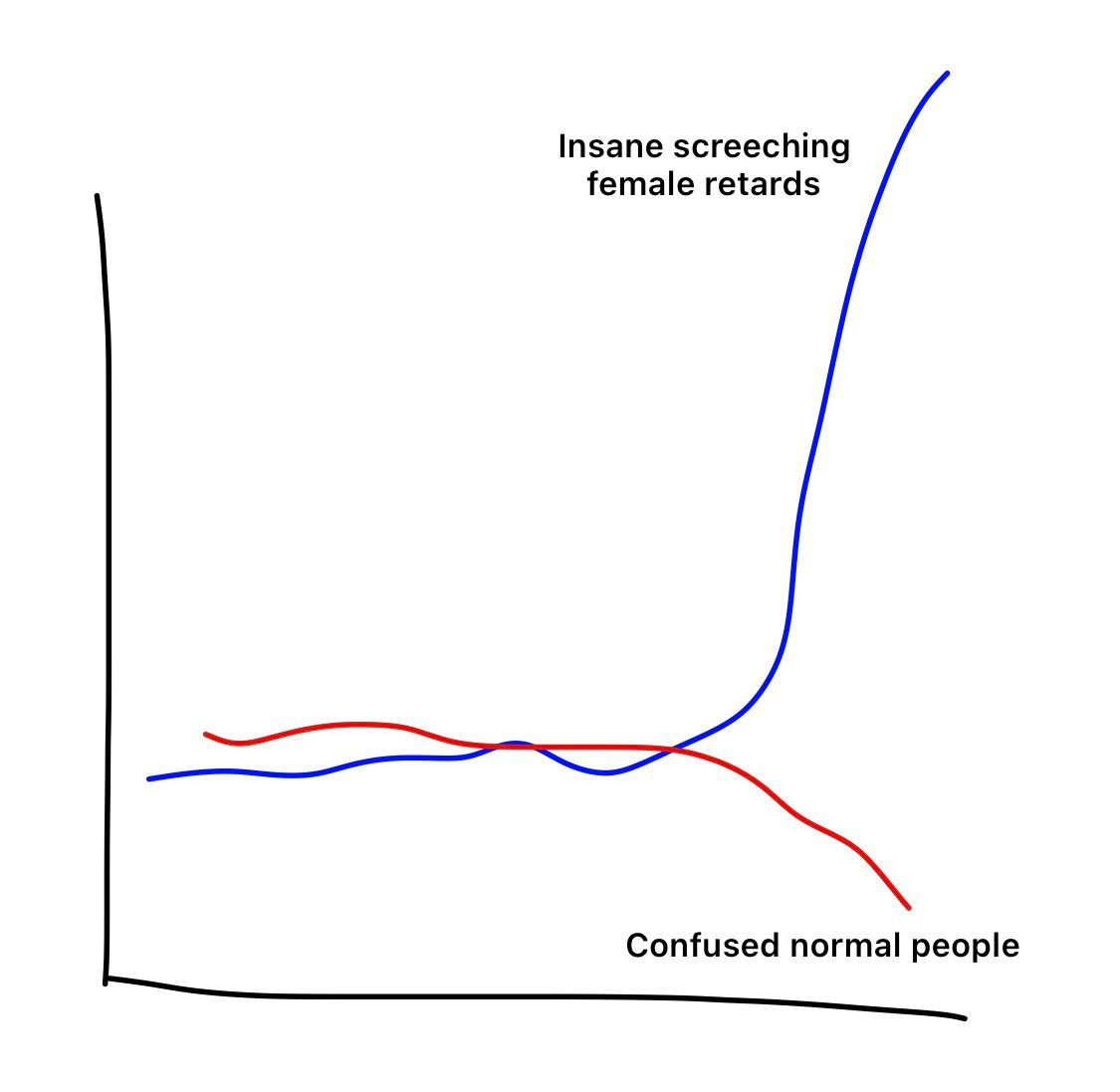


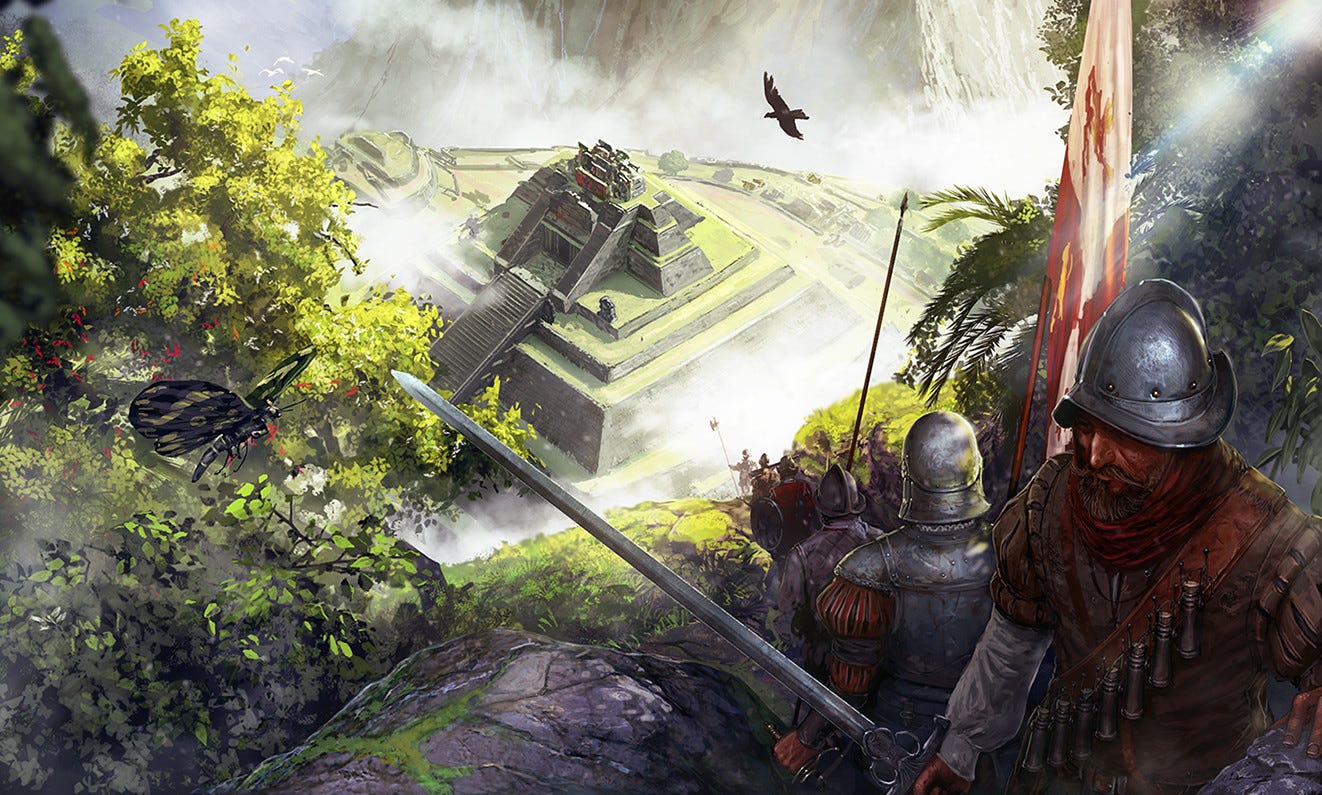
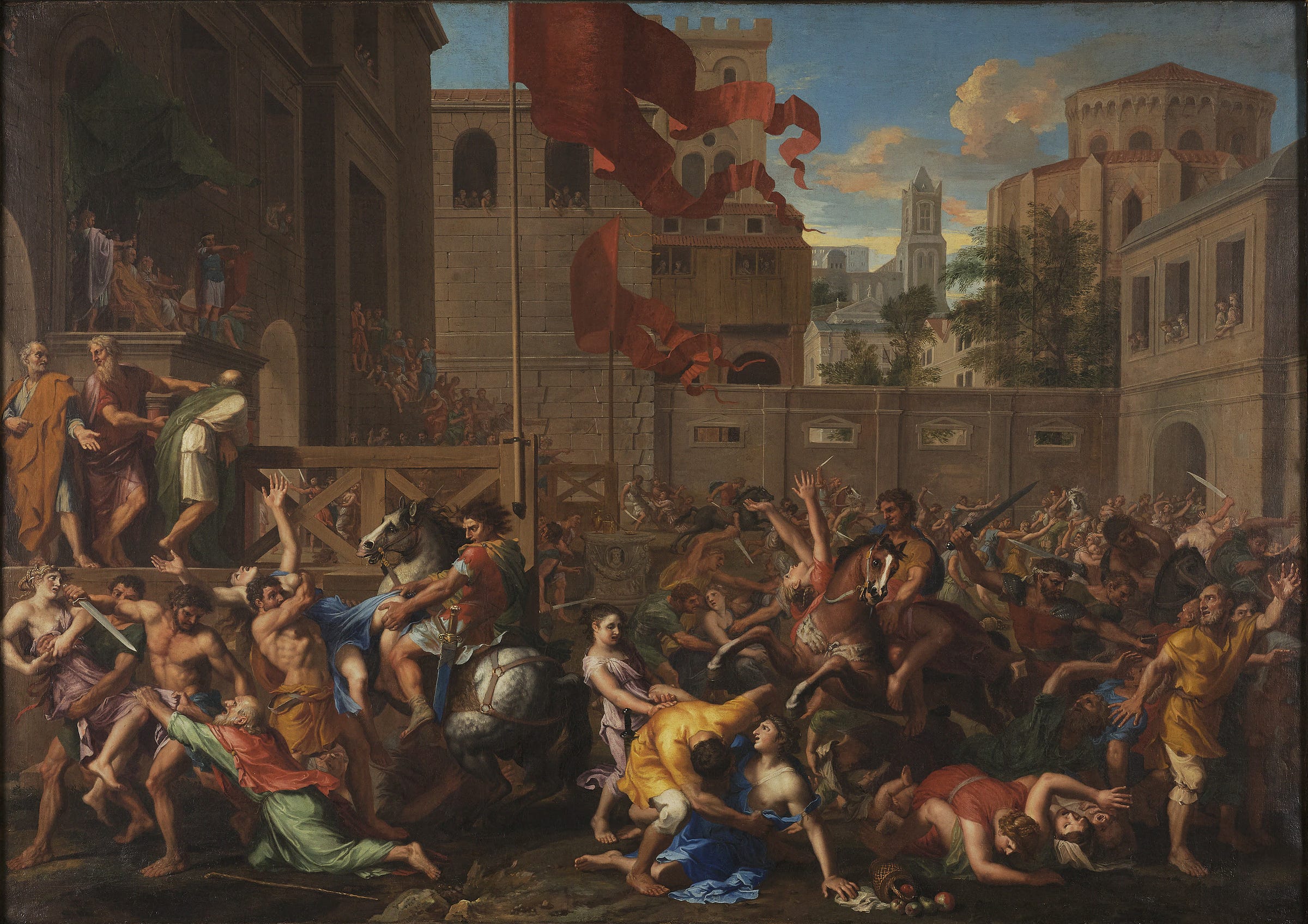




What I'm about to say is coming from "the trenches" (seeing as I'm 22), but the way I see it is this:
1.) Life now means living with one hand behind your back. You're constantly dealing with people of weak visions and voices, and no concreteness of morality or intellect. Nothing feels worse than being chained to a wishy-washy world. It's both oxymoronic and just plain moronic.
2.) Above all else, whatever positive change should be made, it must start from within. I don't work out as hard as I did in high school, but I exercise, I take care of myself, and I stay building. Building my mind, my constitution, my skills. It's why "365 Infantry" and a lot of my fiction centers on heroes and hot rods. Fighters of great skill squaring off against great evils, often riding an iron horse or sat behind the wheel, dressed in denim and leather. These are people (and wolves and other assorted creatures) who must thrive in the face of dire circumstance, sometimes just for their own amusement and out of spite. It's why I'm drawn to heavy metal and fever-dream jazz. Music that makes a statement, that has power. I am drawn to these intuitively. The strength, the vision, the drive. That shit's attractive.
3.) I don't force the matter of dating right now, because I don't see anyone worth my time. The modern dating game is made of equal parts delusions and dishonesty. When all anyone cares about is getting screwed, you get the materialist shit-show on display. Guys driven mad by cravings, girls looking for no commitments, neither realizing something meaningful can bring a greater pleasure than any one-night stand. In a perverse way, my time at college taught me to focus on making the best version of myself so that I can have that meaningful relationship. A self-made man beats staying chained to a desk, and with that self-making comes confidence, and with that comes drive, the rest flows from there. When someone catches my eye and has the willingness to commit that I have, that's the girl to go for. I can only hope all of you don't blow this to hell before that happens lmao.
The Nine Realms of Decadence (WIP)
Asgard = Adgard - the place the Aesir tell you you should be living
Alfheim = DIEheim - land of the Bright Elves, the chosen people who are allowed to be as wrathful as they want - the woke, the billionaires, the diverse.
Jotunheim = Hoetunheim - an orgy. Just, an eternal orgy of giants.
Midgard = Mediagard - the place you live in according to media, blown up and hyperbolized for your consooming benefit
Muspellheim = Managerheim - Safety World, the corporate world, the academic world, where advancement depends on pleasing your fire giant bosses who can brand you as a deplorable.
Nidavellir = Need-em-vellir - the realm of the Dwarf tradies who actually keep things running
Niflheim = Nihilheim - the realm of normal working people who have a hard time imagining affording a home, a car, or getting a promotion
Svartalfheim was canceled for being the realm of the Black Elves. This was considered inappropriate.
Vanaheim = The Banished. Vanaheim was the home of the Vanir, which Wikipedia says are a group of gods associated with wisdom, fertility, and ability to see the future. So, parents.
By the way, about Valhalla:
Valhalla = Fauxhalla, which seems to be a good proxy for the Pixel Valhalla you describe.
On the topic of allegorical schizoposting, I read Dracula recently and found a wealth of things that modern vampire media doesn't emphasize, but in my opinion, should.
https://open.substack.com/pub/argomend/p/blood-drunk-on-you?r=28g8km&utm_campaign=post&utm_medium=web